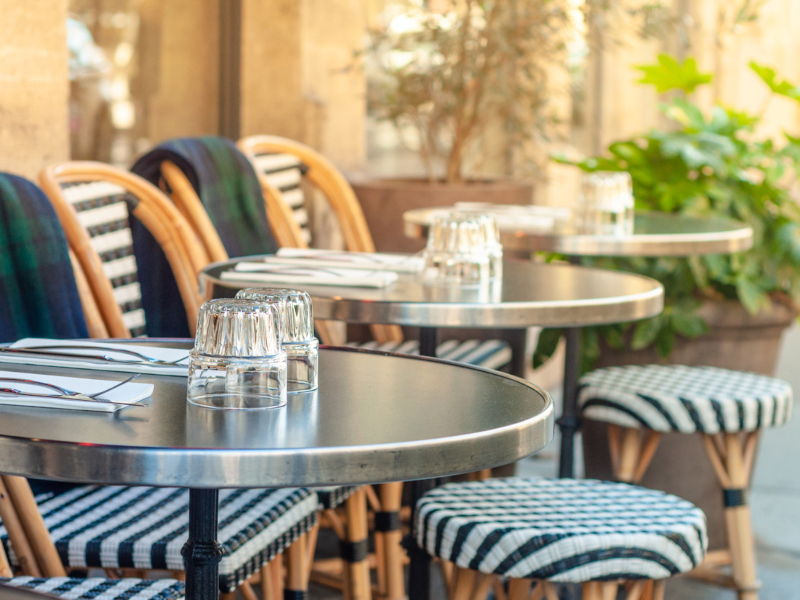Retiring to France - getting your finances in order for the visa application

A large number of our buyers come to France in search of the perfect place to retire. With a slower pace of life, a lovely climate and great food it's no wonder that our region is a popular choice.
When it comes to retiring to France, you will need to make sure that you’ve got your ducks in a row for a successful visa application. Certain financial criteria are used during the application process, so getting your finances in good order ahead of the application, will help everything run smoothly.
We got some tips from Jennie Poate at Beacon Global Wealth, a wealth management firm specialising in providing expert financial advice for those looking to relocate to France. Here she shares the story of her clients that she recently helped make the move to France at retirement.
Robert and Mandy Simpson*, an English couple were planning a move from the north of England to sunny Charente.
Robert, aged 60, was a retired salesman with a private pension bringing in £933 per month. Mandy, aged 58, was a nurse who planned to give up her position to fulfil their long-term dream to live in France.
Each of them has an ISA valued at £60,000, which pays £3000 per year. Robert will receive his pension at the age of 65 (currently estimated at £750 per month).
Both will be eligible for a UK state pension at the age of 67, from which they will receive £780 per month each.
The couple owned a property in the north of England valued at £460,000 and live mortgage-free. They had planned to purchase a €210,000, 2-bedroom cottage in Deux-Sevres in Charente with funds from the sale of their house in England.
With their long-term goals clearly outlined, they approached Jennie for support in executing their plans. Every review of someone’s financial position is unique; so advice cannot be ‘one size fits all’.
To compare UK investments with French taxation policies is akin to apples and oranges, and more often than not, Jennie recommends full encashment prior to becoming tax resident in France.
Having sold their house in the UK and bought in France, Robert and Mandy were ready for the move. Jeanie gave us more information on the questions she helped them answer:
Robert and Mandy: What are the financial requirements for us to be able to apply to live in France?
Jennie: As you’re retiring to France, you need to apply for a long stay visa for those retiring and ‘inactif ’, aka not working. The French government website, www.france-visas.gouv.fr, has all the details you need.
When you apply for your visa, you must provide several documents such as ID, proof of health insurance, accommodation etc and you will need proof that you have sufficient income.
As a guide, income should be at least equivalent to the ‘SMIC’ (minimum wage in France) which is €1231 net per person, per month (€1603.12) gross. Though decisions about applications are taken on a case-by-case basis, this is a good guide to what you should aim for. We have seen some prefectures accept that figure per couple, but to err on the safe side, per person should be used.
Robert: So, how can we make sure we qualify, as our income from pensions will take a few years to fully maximise. But – we do have the money from the house.
Jennie: The French visa office will take into account the fact your house in France will be owned mortgage free. But you will need to generate income from another source to meet the requirements of €2462 per month (per couple). With your joint income from ISAs (£500 per month; €590*) and Robert’s pension (£933 p.m. €1100*), you are currently €762 short and would need to bridge the difference showing regular income from an investment.
Simply showing cash in the bank doesn’t necessarily satisfy the visa office; although it may be sufficient, it’s best not to rely on this.
Once you have purchased your property (£177,000*), you will have £283,000 remaining. To achieve income from this amount to make up the €762.00 shortfall, you’ll need a return of around 3% on those funds. The investment would have to work quite hard to achieve those levels of returns if it was in a medium risk investment, for example.
For comparison, a French bank account called a Livret A currently pays 1.25% p.a. tax free (on a maximum investment of €22,000). We would always check with you what comfort level you have for risk with funds before we would make any investment recommendation.
Mandy: Should we take out a mortgage on the house to increase our investment pot?
Jennie: You could take a mortgage out on the property, as interest rates are low in France. But inflation is currently over 4% p.a. (https://www.rateinflation.com/inflation-rate/france-inflation-rate/) and the risk you take is that interest rates could rise. You will also need to cover the mortgage interest and capital repayments as well as fund income. You would have to consider how comfortable you are in having a mortgage commitment in retirement.
Robert: How can we ensure that we get the income that is required to live in France?
Jennie: Placing your funds into an investment vehicle that can pay out income with lower taxes is an important consideration and given the amount to invest, an ‘Assurance Vie’ is likely to be a good idea. Although it doesn’t give a guaranteed return, in the short term that’s not too much of an issue; though your capital may erode, you have future income from three other pensions. The investment income fills the gap at a higher rate in the early years and then there will be less pressure in the latter years.
You could also consider buying another property and using the rental income from that to reach your target income requirements. If you buy somewhere in the UK, you’ll be taxed in the UK using your marginal rate of tax. You will still retain your nil rate band of £12,500 pa each, so you would potentially have a tax-free income – though this is declarable in France but not taxed again. It also gives you a base in the UK, should that be something that you wish to retain for future consideration. The downside is you would have to manage the property from afar and pay for upkeep. There may also be periods with no tenants and consequently, no income.
Lastly, you could consider a French property for rental/gîte income. If you pursued this option, you wouldn’t be classified inactif or retired in France and would need to apply for a different visa. You would also have to register to pay tax. Be aware that income from a rental in France incurs income tax and also social charges (similar to National Insurance) and therefore as a direct comparison, it can look a little expensive on the tax side.
Comparing rental income to investment income in France is a complex area and careful planning is required to ensure that you maximise every opportunity within your financial strategy.
If you are looking to retire to France from the UK we recommend talking to Jennie for her guidance. You can book a free, no obligation financial consultation with Beacon Global Wealth:
https://beaconglobalwealth.com/
This communication is for informational purposes only and is based on our understanding of current legislation and practices which is subject to change and is not intended to constitute, and should not be construed as, investment advice, investment recommendations or investment research. You should seek advice form a professional adviser before embarking on any financial planning activity. Whilst every effort has been made to ensure the information contained in this communication is correct, we are not
*based on recent exchange rate of 1.18Euros to £1, 2022
*All names have been changed to maintain confidentiality.






